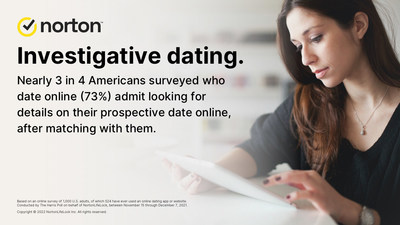Vetting for Love: New Norton Poll Shows 1 in 7 Online Daters Have Paid for Background Checks on Their Dating Matches
On February 9, 2022, NortonLifeLock (NASDAQ: NLOK) released findings from a global study on online dating behaviors, revealing that 49% of U.S. online daters conduct social media searches on potential matches. Conducted in partnership with The Harris Poll, the survey included 1,000 U.S. adults. Alarmingly, 28% of respondents admit to checking a match's friends or family online, and 14% have paid for background checks. The study highlights trends in online 'creeping,' particularly among younger generations, with 39% of 18-39-year-olds showing a willingness to stalk an ex-partner online if undetected.
- NortonLifeLock has highlighted a growing concern in digital security, potentially enhancing brand relevance.
- The study positions Norton as a thought leader in Cyber Safety, attracting potential new customers.
- The survey reveals alarming online behaviors that may indicate a growing concern for user safety, suggesting potential vulnerabilities.
- Increased awareness of online stalking behaviors may lead to heightened anxiety among users regarding their privacy.
TEMPE, Ariz., Feb. 9, 2022 /PRNewswire/ -- Norton, a consumer Cyber Safety brand of NortonLifeLock (NASDAQ: NLOK), today published findings from a global study examining consumers' online creeping behaviors when it comes to prospective partners and romantic interests.
When matching with someone online, it is only natural for people to do a little extra research on their potential dates. Norton surveyed 1,000 U.S. adults ages 18+ online, in partnership with The Harris Poll, and found that the most common tactics for vetting ahead of a prospective date by those that use online dating apps and websites include scrolling through social media profiles (
"Nearly everyone does some form of vetting or online creeping before meeting someone in person for the first time," says Kevin Roundy, technical director, NortonLifeLock. "However, some people are going well beyond vetting, quickly crossing over into concerning "online creeping" territory in which they access highly personal information. We've seen how seemingly minute personal details included in dating profiles and other social media can leave people vulnerable if this information were to get in the wrong hands."
More than a quarter of online daters in the U.S. (
Additional findings from the study include:
- Online creeping isn't just for those who are using online dating platforms: Around one in ten American adults also admit that they have used a payment app (e.g., Venmo, CashApp, etc.) to check on someone else's public activity (
10% ) or have looked at the music account of a romantic interest (9% ). - Social media lurking can lead to awkward moments: Nearly one in five Americans (
19% ) say they have accidentally "deep-liked" an old post or photo on a social media profile of a romantic interest or of their partner's ex-significant other – and it's no surprise younger generations are more likely than their older counterparts to do so (36% aged 18-39 vs.9% aged 40+). - Many are checking in on their romantic partners as well: Two in five Americans who have been in a romantic relationship (
42% ) admit to checking in on their current or former partners without their knowledge or consent. Some admit to tracking their current or former partner's location via a location sharing app (13% ) and creating a fake profile to check on them on social media (10% ). Alarmingly, one in ten (10% ) admit to using "stalkerware" or "creepware". - Gen Z and Millennial adults are more likely to creep online than other generations. A concerning
39% of younger generations aged 18-39 say they would be more likely to stalk a current or former partner online if they knew they would not get caught, compared to only12% aged 40+.
The 2022 Norton Cyber Safety Insights Report: Online Creeping, conducted in partnership with The Harris Poll, surveyed over 10,000 adults ages 18+ across 10 countries1, including 1,000 U.S. adults. To view the study's full results and accompanying visual assets, please visit the press kit at: https://www.nortonlifelock.com/us/en/norton-cyber-safety-center/.
About the 2022 Norton Cyber Safety Insights Report: Special Release – Online Creeping
The research was conducted online by The Harris Poll on behalf of NortonLifeLock among 10,003 adults aged 18+. The survey was conducted November 15 through December 7, 2021 in Australia (n=1002), Brazil (n=1000), France (n=1001), Germany (n=1000), India (n=1000), Italy (n=1000), Japan (n=1000), New Zealand (n=1000), the United Kingdom (n=1000), and the United States (n=1000). Data are weighted where necessary by age, gender, race/ethnicity, region, education, marital status, household size, and household income to bring them in line with their actual proportions in the population. No estimates of theoretical sampling error can be calculated.
About NortonLifeLock Inc.
NortonLifeLock Inc. (NASDAQ: NLOK) is a global leader in consumer Cyber Safety, protecting and empowering people to live their digital lives safely. We are the consumer's trusted ally in an increasingly complex and connected world. Learn more about how we're transforming Cyber Safety at NortonLifeLock.com.
1 Australia, Brazil, France, Germany, India, Italy, Japan, New Zealand, United Kingdom and United States. |
Yosha Brunson Kuhl | Heaven Lampshire |
NortonLifeLock Inc. | Edelman for NortonLifeLock Inc. |
![]() View original content to download multimedia:https://www.prnewswire.com/news-releases/vetting-for-love-new-norton-poll-shows-1-in-7-online-daters-have-paid-for-background-checks-on-their-dating-matches-301478315.html
View original content to download multimedia:https://www.prnewswire.com/news-releases/vetting-for-love-new-norton-poll-shows-1-in-7-online-daters-have-paid-for-background-checks-on-their-dating-matches-301478315.html
SOURCE NortonLifeLock Inc.
FAQ
What were the key findings of the NortonLifeLock study on online dating behaviors?
How many people have paid for background checks on their dating matches according to the survey?
What percentage of younger generations would stalk an ex-partner online if they could do so without getting caught?
When was the NortonLifeLock study conducted?










